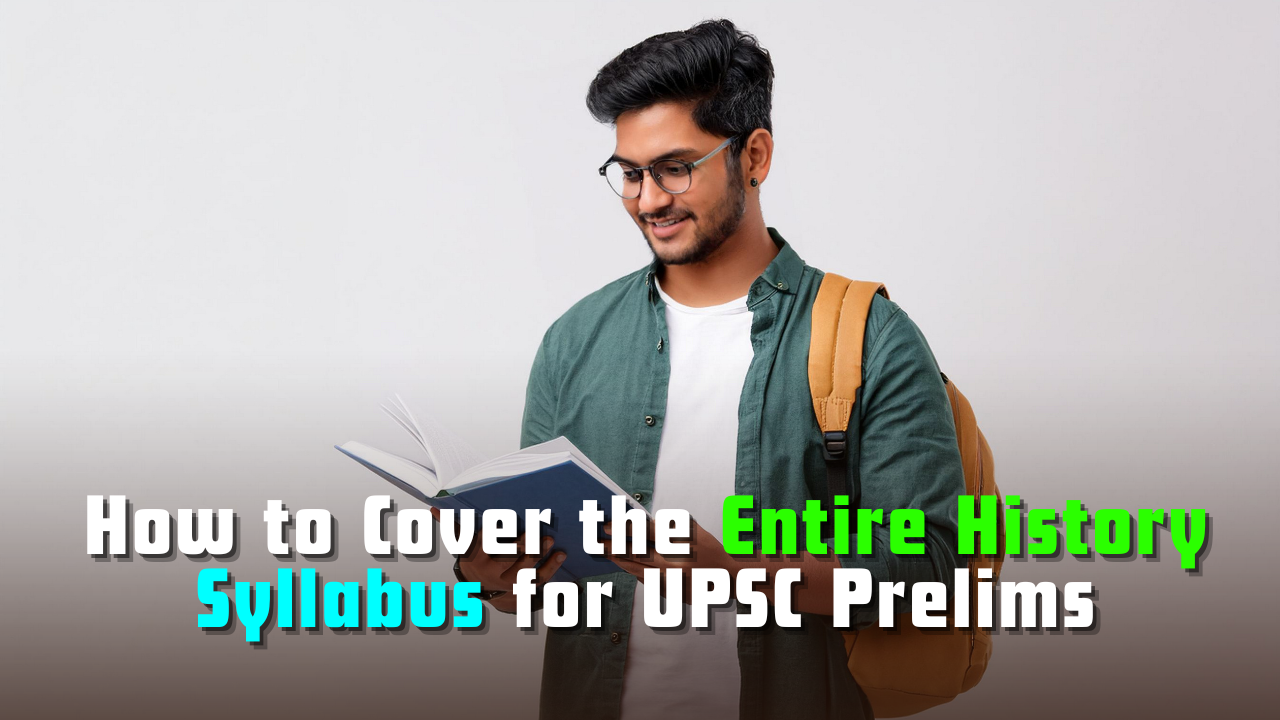How to Cover the Entire History Syllabus for UPSC Prelims
Master Ancient, Medieval, and Modern History Syllabus for UPSC Prelims with smart strategies, booklists, and revision tips.

History is a crucial part of the UPSC Civil Services Examination. It forms a significant portion of the GS Paper I in the prelims and helps in building a strong foundation for Mains as well. For many aspirants, History becomes a scoring area when approached strategically. With limited time and a vast syllabus, knowing how to cover the entire History syllabus for UPSC Prelims efficiently is the key to success.
Understanding the UPSC History Syllabus For Prelims
The UPSC prelims syllabus history section is broadly divided into:
The history syllabus for UPSC prelims is not given in detail in the official notification, but the phrase “History of India and Indian National Movement” is enough to understand its breadth. While Ancient and Medieval are static and factual, Modern History requires understanding of chronology and themes.
Segmentation of Prelims History Syllabus
1. Ancient History Syllabus for UPSC Prelims
Focus on:
- Prehistoric cultures
- Indus Valley Civilization
- Vedic Age and Later Vedic period
- Mahajanapadas and religious reform movements (Buddhism & Jainism)
- Mauryan and post-Mauryan empires
- Gupta period and regional kingdoms
- Art and architecture, philosophy, science
Books:
- Old NCERT by RS Sharma
- Tamil Nadu Class 11 History Book
- Class 6–12 NCERTs for conceptual clarity
The ancient history syllabus for UPSC prelims requires both factual memorization and conceptual clarity. Questions are often indirect and test themes like urbanization, political systems, and cultural evolution.
2. Medieval History for UPSC Prelims
Focus on:
- Delhi Sultanate and Mughal Empire
- Regional Kingdoms and Bhakti-Sufi movements
- Administration, art, architecture, economy and society
Books:
- Old NCERT by Satish Chandra
- Tamil Nadu Class 11–12 History Books
The history prelims syllabus for UPSC in the medieval section is less emphasized than ancient or modern, but 2–3 questions may still be asked.
3. Modern Indian History for UPSC Prelims
Focus on:
- Decline of Mughal Empire and advent of Europeans
- British conquest and expansion
- Socio-religious reform movements
- Uprisings: Revolt of 1857 and tribal-peasant revolts
- Freedom struggle: moderate, extremist, revolutionary phase
- Role of Gandhi, Nehru, Subhash Chandra Bose
- Important acts, sessions, and newspapers
Books:
- Spectrum’s “A Brief History of Modern India”
- Modern India by Bipin Chandra (for deeper understanding)
The UPSC history syllabus for prelims and mains has major overlap in modern Indian history. Most prelims questions come from this segment.
How to Approach History Prelims Preparation
1. Start with NCERTs
Begin with NCERTs of Classes 6–12. They provide conceptual grounding and factual accuracy. For prelims, the old NCERTs are especially useful due to their detailed nature.
2. Prioritise Topics Based on Trends
Go through the last 10 years’ question papers to identify focus areas. For instance, questions on Buddhism and Jainism, Governor-Generals, and INC sessions are frequently asked.
3. Make Thematic Notes
For example:
- Movements (Bhakti, Sufi, Reformist)
- Revolts (tribal, civil, military)
- Acts and legislations
- Important sessions and leaders
These thematic notes help in quick revision.
4. Timeline Charts and Maps
Prepare a timeline for Modern History and visualise empires on maps (especially for Ancient and Medieval India). It helps in solving location-based or chronology questions.
Revision Strategy for History
- First Revision: After reading a book once, make concise notes.
- Second Revision: Revise from notes and highlight frequently asked facts.
- Third Revision (1 month before exam): Attempt MCQs to identify gaps.
- Final Revision (1 week before exam): Focus only on previous year questions and your short notes.
Practice MCQs Religiously
Solving multiple-choice questions daily is a must. It helps to:
- Test factual retention
- Improve accuracy
- Build exam temperament
Use reliable sources like:
- Previous Year UPSC Prelims Papers
- Standard test series with high-quality questions
Integrate History with Art & Culture
Art & Culture is not a separate subject—it’s deeply rooted in history. For instance:
- Temple architecture is linked to the Gupta and Chola periods.
- Sufi and Bhakti traditions are linked to medieval socio-religious movements.
Use Nitin Singhania’s book only for mains-level integration; for prelims, refer to NCERT + CCRT (Culture site).
Common Mistakes to Avoid
- Skipping Ancient/Medieval: Even though fewer questions are asked, skipping them can be risky.
- Over-reliance on Spectrum: It’s a great book, but not enough alone. Complement it with NCERTs.
- Ignoring Map Work: UPSC sometimes asks location-based questions (e.g., excavation sites, kingdoms).
- Studying without PYQs: Solving PYQs helps in understanding the pattern and weightage of topics.
Suggested Booklist (Concise)
- Ancient: Old NCERT by RS Sharma, Tamil Nadu Class 11
- Medieval: Satish Chandra’s Old NCERT, Tamil Nadu Class 12
- Modern: Spectrum by Rajiv Ahir, Modern India by Bipin Chandra
- Additional: NCERT Class 6–12, CCRT for culture
Final Words
Covering the history syllabus for UPSC prelims is all about smart planning and consistent revision. With a blend of conceptual understanding, factual retention, and question-solving ability, aspirants can make History a high-scoring subject. Use NCERTs as your base, revise consistently, and stay focused on PYQs.
Whether it is ancient history syllabus for UPSC prelims or the freedom movement in Modern India, every topic counts. Remember, UPSC may surprise you with unexpected questions—your job is to prepare comprehensively.
Subscribe to our Youtube Channel for more Valuable Content – TheStudyias
Download the App to Subscribe to our Courses – Thestudyias
The Source’s Authority and Ownership of the Article is Claimed By THE STUDY IAS BY MANIKANT SINGH





